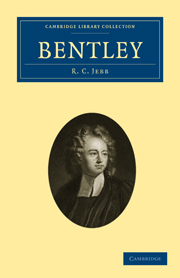Book contents
- Frontmatter
- PREFATORY NOTE
- Contents
- CHAPTER I EARLY LIFE. THE LETTER TO MILL
- CHAPTER II THE BOYLE LECTURES
- CHAPTER III LEARNED CORRESPONDENCE. THE KING'S LIBRARIAN
- CHAPTER IV THE CONTROVERSY ON THE LETTERS OF PHALARIS
- CHAPTER V BENTLEY'S DISSERTATION
- CHAPTER VI TRINITY COLLEGE, CAMBRIDGE
- CHAPTER VII BENTLEY AS MASTER OF TRINITY
- CHAPTER VIII LITERARY WORK AFTER 1700.—HORACE
- CHAPTER IX OTHER CLASSICAL STUDIES. — TERENCE. — MANILIUS. — HOMER
- CHAPTER X THE PROPOSED EDITION OF THE NEW TESTAMENT
- CHAPTER XI ENGLISH STYLE. EDITION OF PARADISE LOST
- CHAPTER XII DOMESTIC LIFE. LAST YEARS
- CHAPTER XIII BENTLEY'S PLACE IN THE HISTORY OF SCHOLARSHIP
CHAPTER IX - OTHER CLASSICAL STUDIES. — TERENCE. — MANILIUS. — HOMER
Published online by Cambridge University Press: 07 September 2010
- Frontmatter
- PREFATORY NOTE
- Contents
- CHAPTER I EARLY LIFE. THE LETTER TO MILL
- CHAPTER II THE BOYLE LECTURES
- CHAPTER III LEARNED CORRESPONDENCE. THE KING'S LIBRARIAN
- CHAPTER IV THE CONTROVERSY ON THE LETTERS OF PHALARIS
- CHAPTER V BENTLEY'S DISSERTATION
- CHAPTER VI TRINITY COLLEGE, CAMBRIDGE
- CHAPTER VII BENTLEY AS MASTER OF TRINITY
- CHAPTER VIII LITERARY WORK AFTER 1700.—HORACE
- CHAPTER IX OTHER CLASSICAL STUDIES. — TERENCE. — MANILIUS. — HOMER
- CHAPTER X THE PROPOSED EDITION OF THE NEW TESTAMENT
- CHAPTER XI ENGLISH STYLE. EDITION OF PARADISE LOST
- CHAPTER XII DOMESTIC LIFE. LAST YEARS
- CHAPTER XIII BENTLEY'S PLACE IN THE HISTORY OF SCHOLARSHIP
Summary
One of Bentley's few intimate friends in the second half of his life was Dr Richard Mead, an eminent physician, and in other ways also a remarkable man. After graduating at the University of Padua, —which, as Cambridge men will remember, had been the second alma mater of Dr John Caius, —Dr Mead began practice at Stepney in 1696. He rose rapidly to the front rank of his profession, in which he stood from about 1720 to his death in 1754. Dibdin describes him with quaint enthusiasm. ‘His house was the general receptacle of men of genius and talent, and of everything beautiful, precious or rare. His curiosities, whether books, or coins, or pictures, were laid open to the public; and the enterprising student and experienced antiquary alike found amusement and a courteous reception. He was known to all foreigners of intellectual distinction, and corresponded both with the artisan and the potentate.’
In 1721—Bentley being in London at the time— Mead gave him a copy of a Greek inscription just published by the accomplished antiquary, Edmund Chishull, who had been chaplain to the English Factory at Smyrna. A marble slab, about 8 feet 7 inches high and 18 inches broad, had been found in the Troad. It is now in the British Museum. This slab had supported the bust of a person who had presented some pieces of plate to the citizens of Sigeum; on the upper part, an inscription in Ionic Greek records the gifts; lower down, nearly the same words are repeated in Attic Greek, with the addition, —‘ Aesopus and his brothers made me.
- Type
- Chapter
- Information
- Bentley , pp. 136 - 156Publisher: Cambridge University PressPrint publication year: 2010First published in: 1882



